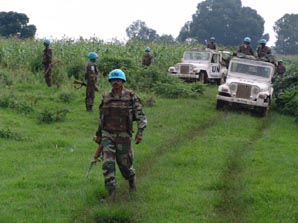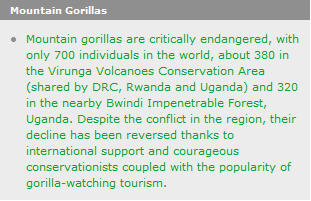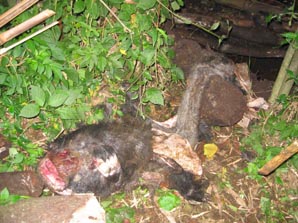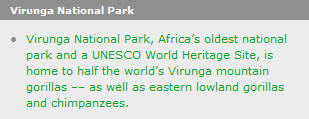Congo Rebels Shoot Silverback Gorilla For Food
By Wildlife Extra/Congo Rangers | Published January 18, 2007
Rebel soldiers commanded by local warlord, Laurent Nkunda, shot and killed a silverback Mountain Gorilla in the Southern Sector of Virunga National Park, in the war torn eastern Democratic Republic of Congo. It has also been confirmed that a second gorilla has also been killed, while unconfirmed reports indicate that possibly several more have been shot.
 The killing happened on 5th January 2007, less than 600 metres from a patrol post at Bikenge, recently abandoned following rebel attacks. Paulin Ngobobo, the chief Warden who leads the rangers who patrol the gorilla sector and face the poachers on a daily basis, and Robert Muir, of the Frankfurt Zoological Society, immediately set off with a small UN escort to find out what was happening and to prevent any further killings.
The killing happened on 5th January 2007, less than 600 metres from a patrol post at Bikenge, recently abandoned following rebel attacks. Paulin Ngobobo, the chief Warden who leads the rangers who patrol the gorilla sector and face the poachers on a daily basis, and Robert Muir, of the Frankfurt Zoological Society, immediately set off with a small UN escort to find out what was happening and to prevent any further killings.
The Congo rangers have continued their work without interruption throughout the war, and during that time the gorilla have increased by over 14%. But this has come at a cost. 97 of Virunga's rangers have died protecting the park's wildlife against poachers since 1996.
YOU CAN HELP THE CONGO RANGERS WITH THEIR DESPERATE EFFORTS TO KEEP THE GORILLAS ALIVE BY DONATING HERE.
A farmer from the area was ordered to help the rebels butcher and collect the meat of the gorilla; he told them the meat was dangerous to eat and informed the Congolese Institute for Nature Conservation (ICCN) of the incident.
 The killing happened on 5th January 2007, less than 600 metres from a patrol post at Bikenge, recently abandoned following rebel attacks. Paulin Ngobobo, the chief Warden who leads the rangers who patrol the gorilla sector and face the poachers on a daily basis, and Robert Muir, of the Frankfurt Zoological Society, immediately set off with a small UN escort to find out what was happening and to prevent any further killings.
The killing happened on 5th January 2007, less than 600 metres from a patrol post at Bikenge, recently abandoned following rebel attacks. Paulin Ngobobo, the chief Warden who leads the rangers who patrol the gorilla sector and face the poachers on a daily basis, and Robert Muir, of the Frankfurt Zoological Society, immediately set off with a small UN escort to find out what was happening and to prevent any further killings.
The Congo rangers have continued their work without interruption throughout the war, and during that time the gorilla have increased by over 14%. But this has come at a cost. 97 of Virunga's rangers have died protecting the park's wildlife against poachers since 1996.
YOU CAN HELP THE CONGO RANGERS WITH THEIR DESPERATE EFFORTS TO KEEP THE GORILLAS ALIVE BY DONATING HERE.
A farmer from the area was ordered to help the rebels butcher and collect the meat of the gorilla; he told them the meat was dangerous to eat and informed the Congolese Institute for Nature Conservation (ICCN) of the incident.

The killing has provoked deep concern among conservationists. Ian Redmond, of the UN Great Apes Survival Project stated, 'in a population this small, every individual counts - and the loss of a trusting young silverback is tragic on many levels'.
The slaughtered silverback, was one of a group of habituated animals, used to human presence having grown up in a group visited regularly by tourists before the DRC civil war. Local communities rely on the protection of the gorillas - of which there remain only 700 worldwide - to boost much needed tourism revenues, which were beginning to pick up after last year's successful election. Tourism is also a proven means of protecting this endangered species and its important forest habitat.
The killing also follows the introduction of cattle into the park by rebels, showing that this is where they intend to settle, thus posing additional threats to the survival of one of the planet's most treasured creatures. It is feared that this latest gorilla killing could be the beginning of a large scale gorilla massacre. It follows the frenzied slaughter of hundreds of hippos on the south-western shore of Lake Edward in Virunga National Park in December by the Mai Mai militia, another armed faction in this turbulent region. In addition, in November Nkunda's rebels attacked and looted patrol posts in the south of the park, forcing rangers, unable to match the rebels' military power, to flee.
It is feared that this latest gorilla killing could be the beginning of a large scale gorilla massacre. It follows the frenzied slaughter of hundreds of hippos on the south-western shore of Lake Edward in Virunga National Park in December by the Mai Mai militia, another armed faction in this turbulent region. In addition, in November Nkunda's rebels attacked and looted patrol posts in the south of the park, forcing rangers, unable to match the rebels' military power, to flee.
Robert Muir from the Frankfurt Zoological Society says, 'The future survival of this species is now under threat, and I fear that this recent attack on the gorillas could signal a wave of such killings if immediate action is not taken to remove Nkunda's and his troops from their habitat.'
A number of conservation groups including the Africa Conservation Fund (ACF), the Great Ape Survival Project (GRASP), Frankfurt Zoological Society (FZS) and Gearing up for Gorillas (G4G) are calling upon the international community to take immediate action to prevent a gorilla massacre. There is a successful precedent for this: In June 2004 a similar incident occurred whereby Nkunda provoked a rebellion in the nearby town of Bukavu and local land traders took advantage of the chaos and began cutting and burning the gorillas' habitat on the southern slopes of Mt. Mikeno. A media and political campaign was launched in Kinshasa and Kigali, and within 3 days the military intervened to order people out of the park. Local communities participated with their support and 2,000 local volunteers built a 20 km dry stone wall to protect the area that had been under attack. The forest has since started to grow back. Through efforts such as this, Congo's mountain gorillas have survived one of the bloodiest civil wars in modern history.

The slaughtered silverback, was one of a group of habituated animals, used to human presence having grown up in a group visited regularly by tourists before the DRC civil war. Local communities rely on the protection of the gorillas - of which there remain only 700 worldwide - to boost much needed tourism revenues, which were beginning to pick up after last year's successful election. Tourism is also a proven means of protecting this endangered species and its important forest habitat.
The killing also follows the introduction of cattle into the park by rebels, showing that this is where they intend to settle, thus posing additional threats to the survival of one of the planet's most treasured creatures.
 It is feared that this latest gorilla killing could be the beginning of a large scale gorilla massacre. It follows the frenzied slaughter of hundreds of hippos on the south-western shore of Lake Edward in Virunga National Park in December by the Mai Mai militia, another armed faction in this turbulent region. In addition, in November Nkunda's rebels attacked and looted patrol posts in the south of the park, forcing rangers, unable to match the rebels' military power, to flee.
It is feared that this latest gorilla killing could be the beginning of a large scale gorilla massacre. It follows the frenzied slaughter of hundreds of hippos on the south-western shore of Lake Edward in Virunga National Park in December by the Mai Mai militia, another armed faction in this turbulent region. In addition, in November Nkunda's rebels attacked and looted patrol posts in the south of the park, forcing rangers, unable to match the rebels' military power, to flee.
Robert Muir from the Frankfurt Zoological Society says, 'The future survival of this species is now under threat, and I fear that this recent attack on the gorillas could signal a wave of such killings if immediate action is not taken to remove Nkunda's and his troops from their habitat.'
A number of conservation groups including the Africa Conservation Fund (ACF), the Great Ape Survival Project (GRASP), Frankfurt Zoological Society (FZS) and Gearing up for Gorillas (G4G) are calling upon the international community to take immediate action to prevent a gorilla massacre. There is a successful precedent for this: In June 2004 a similar incident occurred whereby Nkunda provoked a rebellion in the nearby town of Bukavu and local land traders took advantage of the chaos and began cutting and burning the gorillas' habitat on the southern slopes of Mt. Mikeno. A media and political campaign was launched in Kinshasa and Kigali, and within 3 days the military intervened to order people out of the park. Local communities participated with their support and 2,000 local volunteers built a 20 km dry stone wall to protect the area that had been under attack. The forest has since started to grow back. Through efforts such as this, Congo's mountain gorillas have survived one of the bloodiest civil wars in modern history.

Paulin Ngobobo is the chief Warden for the Southern Sector of Virunga. He leads the rangers who patrol the gorilla sector and face the poachers on a daily basis. His rangers have continued their work without interruption throughout the war, and during that time the gorilla have increased by over 14%. But this has come at a cost. 97 of Virunga's rangers have died protecting the park's wildlife against poachers since 1996.


Richard Leakey, the African Conservationist credited with putting an end to the slaughter of elephants in Kenya during the 1980s, has taken on the cause of Congo's Mountain Gorillas. His programme, www.wildlifedirect.org, has been supporting the rangers of this gorilla park through the provision of equipment, training and funds, and was active in the campaign to save the gorilla sector during the park invasions of 2004.
Leakey is far from despondent 'We were successful in preventing the worst during the 2004 rebellion. The key is to provide support where it is most needed. Congolese rangers on the ground are the mountain gorillas' first and last line of defense. Ultimately, we have to listen and respond to their needs'. To this end, the chief warden runs a blog on www.wildlifedirect.org/gorillaprotection that details the day to day struggle to save these mountain gorillas, and enables people anywhere in the world to participate in that effort.
While the present is extremely precarious for Congo's mountain gorillas, the future is more promising. Congo has just successfully completed its first democratic elections in almost half a century, and the new government has renewed its pledge to protect Virunga's gorillas through the established of a major programme with the European Union to rehabilitate the national park. For that to succeed, Virunga's rangers will have to hold out for a little while longer.
YOU CAN HELP THE CONGO RANGERS WITH THEIR DESPERATE EFFORTS TO KEEP THE GORILLAS ALIVE BY DONATING HERE.
Leakey is far from despondent 'We were successful in preventing the worst during the 2004 rebellion. The key is to provide support where it is most needed. Congolese rangers on the ground are the mountain gorillas' first and last line of defense. Ultimately, we have to listen and respond to their needs'. To this end, the chief warden runs a blog on www.wildlifedirect.org/gorillaprotection that details the day to day struggle to save these mountain gorillas, and enables people anywhere in the world to participate in that effort.
While the present is extremely precarious for Congo's mountain gorillas, the future is more promising. Congo has just successfully completed its first democratic elections in almost half a century, and the new government has renewed its pledge to protect Virunga's gorillas through the established of a major programme with the European Union to rehabilitate the national park. For that to succeed, Virunga's rangers will have to hold out for a little while longer.
YOU CAN HELP THE CONGO RANGERS WITH THEIR DESPERATE EFFORTS TO KEEP THE GORILLAS ALIVE BY DONATING HERE.
Related articles
- • European Union Sanctions Rwanda and M23 Officials over Congo Conflict (March 17, 2025)
- • Canada and Germany Impose Sanctions on Rwanda for Supporting M23 Rebels (March 4, 2025)
- • European Union Suspends Defence Consultations with Rwanda (February 24, 2025)
- • Denis Mukwege Wins Sakharov Prize 2014 (October 21, 2014)
- • New DR Congo amnesty law welcomed by UN envoys (February 5, 2014)
- • Congo Army Takes Control of Mbuzi Hill From M23 Rebels (November 4, 2013)
- • DR Congo Asks Rwanda to Turn Over M23 Rebel Leaders (July 26, 2013)
- • UN Security Council debate focuses on peace efforts for Africa's Great Lakes region (July 25, 2013)
- • At high-level meeting, Ban urges political solution to crisis in eastern DR Congo (September 27, 2012)
- • DR Congo, Rwanda Sign Pact to Fight Rebels in Eastern Congo (July 15, 2012)
- • Kagame Is A Problem for The U.S. and The U.K. (June 23, 2012)
- • UN Report Accuses Rwanda of Supporting Bosco Ntaganda Rebels (May 28, 2012)
- • Kabila, Army Chief of Staff head to eastern Congo to deal with defectors (April 10, 2012)
- • DR Congo Government Warns Bosco Ntaganda He May Face Justice (April 6, 2012)
- • Tshisekedi Says He Won, Can He Prove It? (December 17, 2011)
- • European Union to observe presidential and legislative elections (October 19, 2011)
- • Kabila Confident He Will Win Re-Election (October 18, 2011)
- • EU, DR Congo Sign Elections Funding Agreement (June 25, 2011)
- • UN Report: CNDP, Congolese Soldiers Involved in Illegal Mining Operations (November 30, 2010)
- • Congo Celebrates 50th Anniversary of Independence (June 30, 2010)
- • Southern African countries move to single visa zone (February 26, 2010)
- • DR Congo says ex-rebel chief Nkunda to be extradited from Rwanda in 2010 (January 18, 2010)
- • Southern African Ministers Prepare Report on Regional Crises (January 7, 2010)
- • Human Rights Watch Calls on FDLR Rebels in Eastern Congo to Investigate Themselves (December 15, 2009)
- • Amnesty International: more prosecutions should follow for war crimes in the Kivus (November 19, 2009)
- • Congo rebel fight 'must continue' (November 10, 2009)
- • Human Rights Watch Chalks New Allegations Against Congo, Rwanda Troops (November 3, 2009)
- • Madagascar President Prevented from Taking Floor at UN General Assembly (September 25, 2009)
- • DR Congo deports genocide suspect (September 20, 2009)
- • Human Rights: MONUC releases reports on Kiwanja and Kanyabayonga incidents (September 9, 2009)







